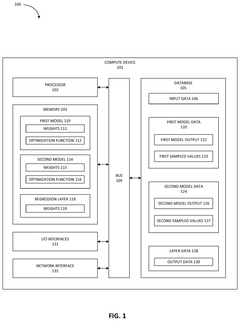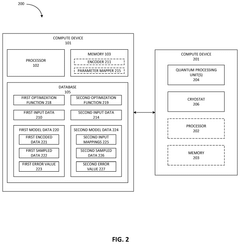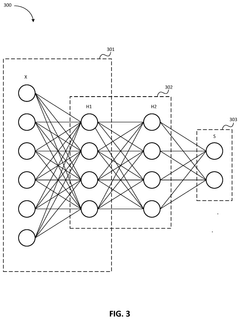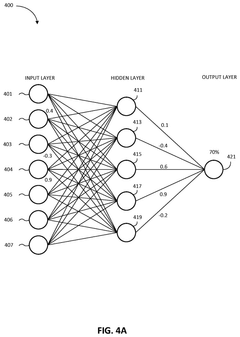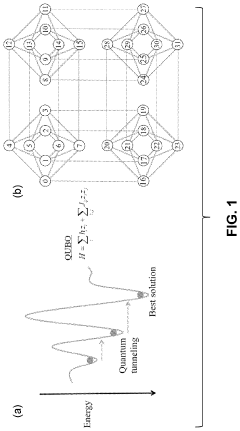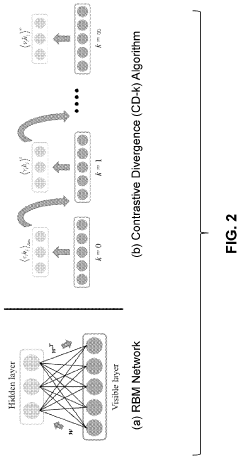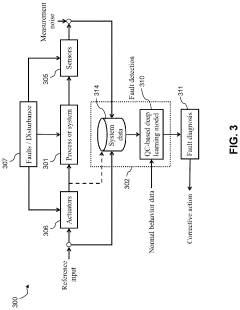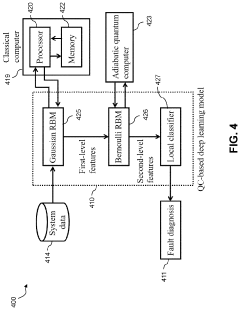Quantum Computing for Enhancing Deep Learning Techniques
JUL 17, 20259 MIN READ
Generate Your Research Report Instantly with AI Agent
Patsnap Eureka helps you evaluate technical feasibility & market potential.
Quantum-DL Synergy
The synergy between quantum computing and deep learning represents a frontier of technological innovation with immense potential to revolutionize both fields. Quantum computing leverages the principles of quantum mechanics to perform complex computations at speeds unattainable by classical computers. Deep learning, a subset of machine learning, utilizes neural networks to process and analyze vast amounts of data. The convergence of these two cutting-edge technologies promises to address some of the most challenging problems in artificial intelligence and data analysis.
Quantum computing offers several advantages that can enhance deep learning techniques. Firstly, quantum algorithms can exponentially speed up certain computational tasks, potentially accelerating the training of large neural networks. This could lead to more efficient model optimization and faster convergence. Secondly, quantum systems can handle high-dimensional data more effectively, which is particularly beneficial for processing complex datasets in deep learning applications.
One of the key areas where quantum-deep learning synergy shows promise is in quantum-enhanced feature spaces. Quantum circuits can be used to create highly expressive feature maps, allowing for more efficient representation of complex data patterns. This can lead to improved classification and regression tasks in machine learning models. Additionally, quantum-inspired algorithms, such as quantum approximate optimization algorithms (QAOA), can be integrated into deep learning frameworks to solve combinatorial optimization problems more efficiently.
Another significant area of synergy is in quantum neural networks (QNNs). These networks utilize quantum gates and quantum states to perform computations, potentially offering advantages in terms of expressivity and efficiency compared to classical neural networks. QNNs can be particularly useful in scenarios where quantum data is directly available or where quantum effects play a crucial role in the problem at hand.
The integration of quantum computing and deep learning also opens up new possibilities for quantum machine learning algorithms. These algorithms can leverage quantum superposition and entanglement to process information in ways that are not possible with classical systems. This could lead to breakthroughs in areas such as quantum state tomography, quantum error correction, and quantum chemistry simulations.
However, it is important to note that the field of quantum-enhanced deep learning is still in its early stages. Significant challenges remain, including the development of stable and scalable quantum hardware, the creation of efficient quantum-classical hybrid algorithms, and the design of quantum-inspired neural network architectures that can outperform classical counterparts in practical applications. As research progresses, the synergy between quantum computing and deep learning is expected to drive innovations across various domains, from drug discovery and materials science to financial modeling and cryptography.
Quantum computing offers several advantages that can enhance deep learning techniques. Firstly, quantum algorithms can exponentially speed up certain computational tasks, potentially accelerating the training of large neural networks. This could lead to more efficient model optimization and faster convergence. Secondly, quantum systems can handle high-dimensional data more effectively, which is particularly beneficial for processing complex datasets in deep learning applications.
One of the key areas where quantum-deep learning synergy shows promise is in quantum-enhanced feature spaces. Quantum circuits can be used to create highly expressive feature maps, allowing for more efficient representation of complex data patterns. This can lead to improved classification and regression tasks in machine learning models. Additionally, quantum-inspired algorithms, such as quantum approximate optimization algorithms (QAOA), can be integrated into deep learning frameworks to solve combinatorial optimization problems more efficiently.
Another significant area of synergy is in quantum neural networks (QNNs). These networks utilize quantum gates and quantum states to perform computations, potentially offering advantages in terms of expressivity and efficiency compared to classical neural networks. QNNs can be particularly useful in scenarios where quantum data is directly available or where quantum effects play a crucial role in the problem at hand.
The integration of quantum computing and deep learning also opens up new possibilities for quantum machine learning algorithms. These algorithms can leverage quantum superposition and entanglement to process information in ways that are not possible with classical systems. This could lead to breakthroughs in areas such as quantum state tomography, quantum error correction, and quantum chemistry simulations.
However, it is important to note that the field of quantum-enhanced deep learning is still in its early stages. Significant challenges remain, including the development of stable and scalable quantum hardware, the creation of efficient quantum-classical hybrid algorithms, and the design of quantum-inspired neural network architectures that can outperform classical counterparts in practical applications. As research progresses, the synergy between quantum computing and deep learning is expected to drive innovations across various domains, from drug discovery and materials science to financial modeling and cryptography.
Market for Quantum-Enhanced AI
The market for quantum-enhanced AI represents a rapidly evolving and potentially transformative sector at the intersection of quantum computing and artificial intelligence. As deep learning techniques continue to advance, the integration of quantum computing capabilities offers promising avenues for enhancing AI performance and capabilities.
The current market landscape is characterized by a mix of established tech giants, specialized quantum computing firms, and AI-focused startups exploring the potential synergies between quantum technologies and machine learning algorithms. Major players like IBM, Google, and Microsoft are investing heavily in both quantum hardware development and quantum-enhanced AI research, while companies such as D-Wave Systems and Rigetti Computing are focusing on quantum-specific applications for machine learning.
Market analysts project significant growth potential for quantum-enhanced AI over the coming decade. The global quantum computing market, which includes quantum-enhanced AI applications, is expected to expand at a compound annual growth rate (CAGR) of over 30% from 2021 to 2028. This growth is driven by increasing demand for more powerful computing solutions to tackle complex problems in areas such as drug discovery, financial modeling, and optimization of supply chains.
Key market segments for quantum-enhanced AI include finance, healthcare, logistics, and cybersecurity. In the financial sector, quantum-enhanced machine learning algorithms show promise for improving risk assessment, fraud detection, and portfolio optimization. The healthcare industry is exploring applications in drug discovery and personalized medicine, leveraging quantum computing's ability to simulate molecular interactions more accurately than classical computers.
Despite the promising outlook, the market for quantum-enhanced AI faces several challenges. The technology is still in its early stages, with many quantum computers operating at a small scale and requiring extremely low temperatures to function. This limits their practical applications and accessibility. Additionally, the shortage of skilled professionals who understand both quantum computing and machine learning presents a significant barrier to widespread adoption.
Investments in quantum-enhanced AI are on the rise, with venture capital firms and government agencies allocating substantial funds to research and development. Several countries, including the United States, China, and European Union members, have launched national quantum initiatives, recognizing the strategic importance of quantum technologies in AI advancement.
As the market matures, we can expect to see a shift from purely research-focused endeavors to more commercial applications. Cloud-based quantum computing services are likely to play a crucial role in democratizing access to quantum-enhanced AI capabilities, allowing a broader range of organizations to experiment with and implement these technologies without significant upfront hardware investments.
The current market landscape is characterized by a mix of established tech giants, specialized quantum computing firms, and AI-focused startups exploring the potential synergies between quantum technologies and machine learning algorithms. Major players like IBM, Google, and Microsoft are investing heavily in both quantum hardware development and quantum-enhanced AI research, while companies such as D-Wave Systems and Rigetti Computing are focusing on quantum-specific applications for machine learning.
Market analysts project significant growth potential for quantum-enhanced AI over the coming decade. The global quantum computing market, which includes quantum-enhanced AI applications, is expected to expand at a compound annual growth rate (CAGR) of over 30% from 2021 to 2028. This growth is driven by increasing demand for more powerful computing solutions to tackle complex problems in areas such as drug discovery, financial modeling, and optimization of supply chains.
Key market segments for quantum-enhanced AI include finance, healthcare, logistics, and cybersecurity. In the financial sector, quantum-enhanced machine learning algorithms show promise for improving risk assessment, fraud detection, and portfolio optimization. The healthcare industry is exploring applications in drug discovery and personalized medicine, leveraging quantum computing's ability to simulate molecular interactions more accurately than classical computers.
Despite the promising outlook, the market for quantum-enhanced AI faces several challenges. The technology is still in its early stages, with many quantum computers operating at a small scale and requiring extremely low temperatures to function. This limits their practical applications and accessibility. Additionally, the shortage of skilled professionals who understand both quantum computing and machine learning presents a significant barrier to widespread adoption.
Investments in quantum-enhanced AI are on the rise, with venture capital firms and government agencies allocating substantial funds to research and development. Several countries, including the United States, China, and European Union members, have launched national quantum initiatives, recognizing the strategic importance of quantum technologies in AI advancement.
As the market matures, we can expect to see a shift from purely research-focused endeavors to more commercial applications. Cloud-based quantum computing services are likely to play a crucial role in democratizing access to quantum-enhanced AI capabilities, allowing a broader range of organizations to experiment with and implement these technologies without significant upfront hardware investments.
Quantum Computing Challenges
Quantum computing presents several significant challenges when applied to enhancing deep learning techniques. One of the primary obstacles is the current limitation in qubit coherence time. Quantum states are extremely fragile and susceptible to environmental noise, leading to decoherence. This restricts the duration for which quantum computations can be performed reliably, potentially limiting the depth and complexity of quantum-enhanced deep learning models.
Another major challenge is the scalability of quantum systems. While classical deep learning models can easily scale to millions of parameters, quantum systems struggle to maintain a large number of qubits in a coherent state. This scalability issue hampers the ability to implement large-scale quantum-enhanced neural networks that could potentially outperform classical counterparts in complex tasks.
Error correction is a critical challenge in quantum computing for deep learning applications. Quantum error correction techniques are essential to mitigate the effects of noise and decoherence, but they come at the cost of increased qubit overhead and computational complexity. Developing efficient error correction methods that can support quantum-enhanced deep learning algorithms remains an active area of research.
The lack of quantum-specific algorithms optimized for deep learning tasks poses another significant challenge. While quantum algorithms like quantum approximate optimization algorithm (QAOA) and variational quantum eigensolver (VQE) show promise, their direct application to deep learning problems is not straightforward. Developing quantum algorithms that can effectively leverage the unique properties of quantum systems for neural network training and inference is crucial for realizing the full potential of quantum-enhanced deep learning.
Hardware limitations also present challenges in integrating quantum computing with deep learning techniques. Current quantum processors have limited connectivity between qubits, restricting the types of quantum circuits that can be implemented efficiently. Additionally, the absence of quantum memory that can store and retrieve quantum states reliably hinders the development of quantum-enhanced recurrent neural networks and other memory-dependent architectures.
Lastly, the classical-quantum interface poses a significant challenge. Efficiently encoding classical data into quantum states and measuring quantum outputs to obtain classical results are non-trivial tasks. Developing effective methods for data encoding and result extraction that preserve the quantum advantage while minimizing overhead is crucial for practical quantum-enhanced deep learning applications.
Another major challenge is the scalability of quantum systems. While classical deep learning models can easily scale to millions of parameters, quantum systems struggle to maintain a large number of qubits in a coherent state. This scalability issue hampers the ability to implement large-scale quantum-enhanced neural networks that could potentially outperform classical counterparts in complex tasks.
Error correction is a critical challenge in quantum computing for deep learning applications. Quantum error correction techniques are essential to mitigate the effects of noise and decoherence, but they come at the cost of increased qubit overhead and computational complexity. Developing efficient error correction methods that can support quantum-enhanced deep learning algorithms remains an active area of research.
The lack of quantum-specific algorithms optimized for deep learning tasks poses another significant challenge. While quantum algorithms like quantum approximate optimization algorithm (QAOA) and variational quantum eigensolver (VQE) show promise, their direct application to deep learning problems is not straightforward. Developing quantum algorithms that can effectively leverage the unique properties of quantum systems for neural network training and inference is crucial for realizing the full potential of quantum-enhanced deep learning.
Hardware limitations also present challenges in integrating quantum computing with deep learning techniques. Current quantum processors have limited connectivity between qubits, restricting the types of quantum circuits that can be implemented efficiently. Additionally, the absence of quantum memory that can store and retrieve quantum states reliably hinders the development of quantum-enhanced recurrent neural networks and other memory-dependent architectures.
Lastly, the classical-quantum interface poses a significant challenge. Efficiently encoding classical data into quantum states and measuring quantum outputs to obtain classical results are non-trivial tasks. Developing effective methods for data encoding and result extraction that preserve the quantum advantage while minimizing overhead is crucial for practical quantum-enhanced deep learning applications.
Quantum-DL Implementations
01 Quantum-enhanced neural networks
This approach integrates quantum computing principles into deep learning architectures, potentially offering exponential speedups for certain machine learning tasks. Quantum neural networks can process quantum data directly and may handle complex patterns more efficiently than classical neural networks.- Quantum-enhanced neural networks: This approach integrates quantum computing principles into deep learning architectures, potentially offering exponential speedups for certain machine learning tasks. Quantum neural networks can process quantum data and perform operations that are not possible with classical neural networks, potentially leading to more powerful and efficient AI models.
- Quantum-classical hybrid algorithms: These techniques combine quantum and classical computing resources to leverage the strengths of both paradigms. Hybrid algorithms can be used to optimize deep learning models, perform feature selection, or enhance data preprocessing, potentially improving the overall performance and efficiency of deep learning systems.
- Quantum-inspired classical algorithms: This approach involves developing classical algorithms that mimic certain aspects of quantum computing. These techniques can potentially offer some of the advantages of quantum computing without requiring actual quantum hardware, making them more accessible and immediately applicable to current deep learning challenges.
- Quantum data encoding and feature extraction: These methods focus on leveraging quantum systems for efficient data encoding and feature extraction in deep learning pipelines. Quantum techniques can potentially represent complex data structures more compactly and extract relevant features more effectively than classical approaches, leading to improved model performance and reduced computational requirements.
- Quantum-enhanced optimization for deep learning: This approach uses quantum computing techniques to optimize various aspects of deep learning models, such as hyperparameter tuning, weight optimization, and architecture search. Quantum optimization algorithms may offer advantages in exploring complex parameter spaces more efficiently, potentially leading to better-performing and more robust deep learning models.
02 Quantum-classical hybrid algorithms
These techniques combine quantum and classical computing resources to optimize deep learning processes. Hybrid algorithms leverage the strengths of both quantum and classical systems, potentially improving the performance and efficiency of deep learning models for specific applications.Expand Specific Solutions03 Quantum-inspired classical algorithms
This approach involves developing classical algorithms inspired by quantum computing concepts. These algorithms aim to capture some of the advantages of quantum computing without requiring actual quantum hardware, potentially leading to improved performance in deep learning tasks on classical computers.Expand Specific Solutions04 Quantum feature maps and kernel methods
These techniques use quantum circuits to create high-dimensional feature spaces, potentially allowing for more effective data representation and classification in deep learning models. Quantum kernel methods can be used to enhance the performance of support vector machines and other kernel-based algorithms.Expand Specific Solutions05 Quantum-assisted optimization for deep learning
This approach uses quantum algorithms to optimize the training process of deep learning models. Quantum-assisted optimization techniques may help in finding global optima more efficiently, potentially improving the convergence and performance of deep neural networks.Expand Specific Solutions
Quantum-AI Industry Leaders
The quantum computing landscape for enhancing deep learning techniques is in a dynamic growth phase, with significant market potential and increasing technological maturity. The market is expanding rapidly, driven by the promise of exponential computational power for complex AI tasks. Key players like Google, IBM, and Origin Quantum are making substantial advancements, while startups such as Zapata Computing and Equal1 Labs are introducing innovative solutions. Established tech giants like Samsung and Microsoft are also investing heavily in this field. The technology is progressing from experimental stages to practical applications, with companies focusing on developing quantum algorithms specifically tailored for deep learning tasks. As the field matures, we're seeing a shift towards more specialized quantum hardware and software solutions designed to tackle specific deep learning challenges.
Google LLC
Technical Solution: Google's approach to quantum-enhanced deep learning involves the development of quantum neural networks (QNNs) and quantum approximate optimization algorithms (QAOA). Their Sycamore quantum processor has demonstrated quantum supremacy, processing tasks in minutes that would take classical supercomputers thousands of years[4]. Google has proposed using QNNs for feature extraction and data encoding in deep learning models, potentially improving their efficiency and accuracy[5]. Additionally, they are exploring quantum-inspired algorithms that can run on classical hardware but leverage quantum principles to enhance deep learning performance, particularly in areas like optimization and sampling[6].
Strengths: Cutting-edge quantum hardware, strong integration with classical machine learning infrastructure. Weaknesses: Quantum error correction still a significant challenge, limited practical applications demonstrated so far.
International Business Machines Corp.
Technical Solution: IBM has developed a quantum-enhanced machine learning approach called Quantum Kernel Alignment (QKA) for enhancing deep learning techniques. This method leverages quantum circuits to create kernel functions that are difficult to simulate classically, potentially offering a quantum advantage in machine learning tasks[1]. IBM's quantum computers, such as the 127-qubit Eagle processor, are used to implement these quantum kernels, which can then be integrated into classical deep learning models[2]. The company has also explored quantum-classical hybrid algorithms, where quantum circuits are used to enhance specific layers or components of deep neural networks, potentially improving their performance on complex tasks[3].
Strengths: Access to advanced quantum hardware, extensive research in quantum-classical hybrid algorithms. Weaknesses: Limited qubit coherence times, scalability challenges in current quantum systems.
Quantum-DL Breakthroughs
Methods and apparatus for time-series forecasting using deep learning models of a deep belief network with quantum computing
PatentPendingUS20240403671A1
Innovation
- The integration of a Deep Belief Network (DBN) with quantum computing, where a processor initializes weights for a deep learning model, transmits data to a quantum compute device for optimization, and updates the weights based on sampled values to train the model, generating accurate predictions through a regression layer.
Quantum computing based deep learning for detection, diagnosis and other applications
PatentPendingUS20230094389A1
Innovation
- A quantum computing-based deep learning method utilizing multi-layer neural networks, specifically deep belief networks, with quantum sampling and optimization for training, to extract features and detect faults in industrial processes, overcoming the limitations of classical methods by leveraging quantum computing's speed and noise for efficient fault detection and diagnosis.
Quantum-DL Hardware Advances
The field of quantum computing hardware for deep learning has witnessed significant advancements in recent years. These developments are primarily focused on creating quantum processors capable of executing quantum-enhanced machine learning algorithms efficiently. One of the key areas of progress is the development of quantum annealing processors, which have shown promise in solving optimization problems relevant to deep learning tasks.
Companies like D-Wave Systems have been at the forefront of quantum annealing hardware development, with their latest generation of processors featuring over 5000 qubits. These processors have demonstrated the ability to tackle complex optimization problems that are challenging for classical computers, potentially offering advantages in training deep neural networks.
Another important hardware advancement is the development of gate-based quantum processors. Tech giants such as IBM, Google, and Intel have made substantial progress in this area, with IBM's latest quantum processor, Eagle, boasting 127 qubits. These gate-based systems are more versatile than quantum annealers and can potentially implement a wider range of quantum algorithms for deep learning applications.
Superconducting qubit technology has emerged as a leading platform for quantum-DL hardware due to its scalability and relatively long coherence times. However, other qubit technologies, such as trapped ions and topological qubits, are also being explored for their potential advantages in quantum machine learning tasks.
A critical aspect of quantum-DL hardware development is the improvement of qubit quality and error correction techniques. Researchers are working on increasing qubit coherence times and gate fidelities, which are essential for implementing complex quantum circuits required for deep learning algorithms. Advanced error correction schemes, such as surface codes, are being integrated into hardware designs to mitigate the effects of quantum noise and decoherence.
The integration of classical and quantum hardware is another area of focus in quantum-DL hardware advances. Hybrid quantum-classical systems are being developed to leverage the strengths of both paradigms, allowing for more efficient implementation of quantum-enhanced deep learning algorithms. This approach includes the development of specialized control electronics and software interfaces to seamlessly connect quantum processors with classical computing resources.
As quantum-DL hardware continues to evolve, researchers are also exploring novel qubit architectures and topologies optimized for machine learning tasks. These include designs that facilitate the implementation of quantum neural networks and quantum convolutional layers, potentially offering significant speedups in certain deep learning operations.
Companies like D-Wave Systems have been at the forefront of quantum annealing hardware development, with their latest generation of processors featuring over 5000 qubits. These processors have demonstrated the ability to tackle complex optimization problems that are challenging for classical computers, potentially offering advantages in training deep neural networks.
Another important hardware advancement is the development of gate-based quantum processors. Tech giants such as IBM, Google, and Intel have made substantial progress in this area, with IBM's latest quantum processor, Eagle, boasting 127 qubits. These gate-based systems are more versatile than quantum annealers and can potentially implement a wider range of quantum algorithms for deep learning applications.
Superconducting qubit technology has emerged as a leading platform for quantum-DL hardware due to its scalability and relatively long coherence times. However, other qubit technologies, such as trapped ions and topological qubits, are also being explored for their potential advantages in quantum machine learning tasks.
A critical aspect of quantum-DL hardware development is the improvement of qubit quality and error correction techniques. Researchers are working on increasing qubit coherence times and gate fidelities, which are essential for implementing complex quantum circuits required for deep learning algorithms. Advanced error correction schemes, such as surface codes, are being integrated into hardware designs to mitigate the effects of quantum noise and decoherence.
The integration of classical and quantum hardware is another area of focus in quantum-DL hardware advances. Hybrid quantum-classical systems are being developed to leverage the strengths of both paradigms, allowing for more efficient implementation of quantum-enhanced deep learning algorithms. This approach includes the development of specialized control electronics and software interfaces to seamlessly connect quantum processors with classical computing resources.
As quantum-DL hardware continues to evolve, researchers are also exploring novel qubit architectures and topologies optimized for machine learning tasks. These include designs that facilitate the implementation of quantum neural networks and quantum convolutional layers, potentially offering significant speedups in certain deep learning operations.
Quantum-DL Ethics & Security
As quantum computing and deep learning technologies continue to advance, it is crucial to address the ethical and security implications of their convergence. The integration of quantum computing with deep learning techniques raises significant concerns that require careful consideration and proactive measures.
One of the primary ethical concerns is the potential for quantum-enhanced deep learning systems to exacerbate existing biases and inequalities. These advanced systems may amplify biases present in training data, leading to discriminatory outcomes in areas such as hiring, lending, and criminal justice. To mitigate this risk, researchers and developers must prioritize fairness and transparency in algorithm design and data selection.
Privacy and data protection present another critical challenge. Quantum computing's ability to process vast amounts of data at unprecedented speeds could enable more sophisticated analysis of personal information, potentially compromising individual privacy. Implementing robust encryption methods and developing quantum-resistant cryptographic algorithms are essential to safeguard sensitive data in the quantum era.
The security implications of quantum-enhanced deep learning are equally significant. Quantum computers have the potential to break many current encryption methods, posing a severe threat to cybersecurity. As quantum-DL systems become more prevalent, ensuring their resilience against quantum attacks becomes paramount. This necessitates the development of post-quantum cryptography and quantum-safe communication protocols.
Moreover, the dual-use nature of quantum-DL technologies raises concerns about their potential misuse. These powerful tools could be exploited for malicious purposes, such as creating highly sophisticated deepfakes or launching more effective cyberattacks. Establishing international guidelines and regulations for the responsible development and use of quantum-DL technologies is crucial to prevent their weaponization.
The concentration of quantum computing resources in the hands of a few entities also presents ethical and security challenges. This technological disparity could lead to power imbalances and exacerbate global inequalities. Efforts should be made to promote equitable access to quantum-DL technologies and foster international collaboration in their development and deployment.
To address these challenges, a multidisciplinary approach involving ethicists, policymakers, and technologists is essential. Developing ethical frameworks specifically tailored to quantum-DL applications, implementing robust security measures, and promoting responsible innovation are key steps in ensuring that the benefits of these transformative technologies are realized while minimizing potential harm.
One of the primary ethical concerns is the potential for quantum-enhanced deep learning systems to exacerbate existing biases and inequalities. These advanced systems may amplify biases present in training data, leading to discriminatory outcomes in areas such as hiring, lending, and criminal justice. To mitigate this risk, researchers and developers must prioritize fairness and transparency in algorithm design and data selection.
Privacy and data protection present another critical challenge. Quantum computing's ability to process vast amounts of data at unprecedented speeds could enable more sophisticated analysis of personal information, potentially compromising individual privacy. Implementing robust encryption methods and developing quantum-resistant cryptographic algorithms are essential to safeguard sensitive data in the quantum era.
The security implications of quantum-enhanced deep learning are equally significant. Quantum computers have the potential to break many current encryption methods, posing a severe threat to cybersecurity. As quantum-DL systems become more prevalent, ensuring their resilience against quantum attacks becomes paramount. This necessitates the development of post-quantum cryptography and quantum-safe communication protocols.
Moreover, the dual-use nature of quantum-DL technologies raises concerns about their potential misuse. These powerful tools could be exploited for malicious purposes, such as creating highly sophisticated deepfakes or launching more effective cyberattacks. Establishing international guidelines and regulations for the responsible development and use of quantum-DL technologies is crucial to prevent their weaponization.
The concentration of quantum computing resources in the hands of a few entities also presents ethical and security challenges. This technological disparity could lead to power imbalances and exacerbate global inequalities. Efforts should be made to promote equitable access to quantum-DL technologies and foster international collaboration in their development and deployment.
To address these challenges, a multidisciplinary approach involving ethicists, policymakers, and technologists is essential. Developing ethical frameworks specifically tailored to quantum-DL applications, implementing robust security measures, and promoting responsible innovation are key steps in ensuring that the benefits of these transformative technologies are realized while minimizing potential harm.
Unlock deeper insights with Patsnap Eureka Quick Research — get a full tech report to explore trends and direct your research. Try now!
Generate Your Research Report Instantly with AI Agent
Supercharge your innovation with Patsnap Eureka AI Agent Platform!
